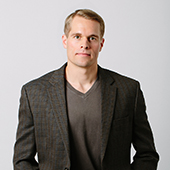Finding Universal Truths in Fiction

Novelist Ross Ritchell has a simple message for students working to improve their craft: “Any writer who doesn’t talk about how much luck is involved in the process is full of it.”
Ritchell’s novel, The Knife, was published by the Blue Rider Press imprint of Penguin Random House in 2015 to critical acclaim, and hailed by the Chicago Tribune as a “literary masterpiece.” A veteran of the U.S. Army Rangers, Ritchell based his book on his experience as a special ops soldier in the Middle East. After losing his hearing, Ritchell returned to the States where he finished his undergraduate degree at Loyola University Chicago. During his senior year, he realized how much he wanted to pursue writing, and with encouragement from his wife, dove headfirst into the Master of Fine Arts in Creative Writing program at Northwestern. Within months of earning his MFA, Ritchell found an agent and signed his first book deal.
When he’s invested in a project, Ritchell will write anywhere from 5 to 10 hours a day for months on end, until he’s happy with the finished project. He likens this experience to grueling two-a-day practices he enjoyed as a high school football player. He believes if you’re willing to work, the hours fly by. However, despite his indefatigable work ethic, Ritchell will be the first to admit he was lucky.
“It’s really discouraging for writers who are trying to break through when those who have experienced success act like they didn’t have to work hard and get lucky,” said Ritchell. “If my agent was having a bad morning or didn’t want a piece of war fiction, who knows where I’d be today? Of course, the hard work is also critical. You can’t get lucky without hard work.”
Ritchell honed the novel that became The Knife while he was a student in the MFA program. He worked on an early draft, which served as his final thesis, with faculty members Eugene Cross and Goldie Goldbloom. Ritchell also enjoyed learning with renowned writers Stuart Dybek and Christine Sneed, as well as an eclectic cohort of students who were helpful and supportive. While Ritchell saw success quickly after graduation, he was most grateful for having the time to seriously focus on his craft.
“No one knows who the next writer is going to be,” said Ritchell. “They can come out of anywhere, but an MFA helps guarantee that you’ll be serious about reading and writing during your time there. I think that’s one of the greatest things about the program.”
He added, “The MFA is really what you make of it. If you use your resources, reach out to your professors, and take feedback in stride from other students, you’re only setting yourself up to be a better writer every quarter.”
Later this summer, Ritchell transitions from the role of student to teacher as an instructor at the 2017 Northwestern University Summer Writers’ Conference. His workshop, titled Life as War, War as Life, will examine how emotional and physical traumas can bring out universal truths in works of fiction. The class stems from Ritchell’s belief that everyone has faced challenging experiences that can be applied to writing powerful stories.
Ritchell’s second novel, which is currently under consideration at several publishing houses, veers away from the contemporary military fiction of his first, and he is just beginning to draft his third book. A busy husband and father, Ritchell and his wife also recently welcomed their third child to the family, but he seeks out time to put in the hours writing whenever he can.
“Writing has to be a labor of love,” Ritchell concluded. “If you take the love out, it’ll be unfulfilling. You have to question too many things about yourself to make it happen to not be committed. If it’s not part of your everyday schedule, it’s not going to work.”
